- Clone
- 24F (See other available formats)
- Regulatory Status
- RUO
- Other Names
- B7-2, B70
- Isotype
- Mouse IgG1, κ
- Ave. Rating
- Submit a Review
- Product Citations
- publications
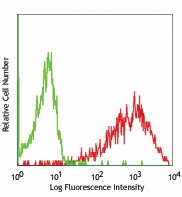
-

LPS-stimulated (3 days) LOU rat splenocytes stained with biotinylated 24F, followed by SAV-PE
| Cat # | Size | Price | Quantity Check Availability | Save | ||
|---|---|---|---|---|---|---|
| 200303 | 50 µg | 101 CHF | ||||
CD86 is an 80 kD member of the immunoglobulin superfamily also known as B70 or B7-2. It is expressed on antigen presenting cells and activated T and B cells. CD86 is a ligand for CD28 and CD152 (CTLA-4). It is one of the accessory molecules that plays an important role in T cell-APC cell costimulatory interactions. The 24F antibody can block the co-stimulatory activity of CD86.
Product DetailsProduct Details
- Verified Reactivity
- Rat
- Antibody Type
- Monoclonal
- Host Species
- Mouse
- Immunogen
- HTLV-1-transformed Lewis-S1 rat T cell line
- Formulation
- Phosphate-buffered solution, pH 7.2, containing 0.09% sodium azide.
- Preparation
- The antibody was purified by affinity chromatography, and conjugated with biotin under optimal conditions.
- Concentration
- 0.5 mg/ml
- Storage & Handling
- The antibody solution should be stored undiluted between 2°C and 8°C. Do not freeze.
- Application
-
FC - Quality tested
- Recommended Usage
-
Each lot of this antibody is quality control tested by immunofluorescent staining with flow cytometric analysis. For flow cytometric staining, the suggested use of this reagent is ≤1.0 µg per million cells in 100 µl volume. It is recommended that the reagent be titrated for optimal performance for each application.
- Application Notes
-
Additional reported applications (for the relevant formats) include: immunoprecipitation1-3, blocking of costimulation of T cells1-3, and immunohistochemical staining of acetone-fixed frozen sections3. The LEAF™ purified antibody (Endotoxin <0.1 EU/µg, Azide-Free, 0.2 µm filtered) is recommended for functional assays (Cat. No. 200310).
-
Application References
(PubMed link indicates BioLegend citation) -
- Maeda K, et al. 1997. Int. Immunol. 9:993. (IP, Block)
- Bluestone JA. 1995. Immunity 2:555. (IP, Block)
- Damoiseaux JG, et al. 1998. J. Leuk. Biol. 64:803. (IP, Block, IHC)
- Donius LR, et al. 2014. Immunobiology. 219:440. PubMed
- Product Citations
-
- RRID
-
AB_313852 (BioLegend Cat. No. 200303)
Antigen Details
- Structure
- Ig superfamily, 80 kD
- Distribution
-
Antigen presenting cells, activated B cells and T cells
- Function
- T and B cell costimulation
- Ligand/Receptor
- CD28, CD152 (CTLA-4)
- Cell Type
- B cells, T cells, Antigen-presenting cells
- Biology Area
- Cell Biology, Immunology, Neuroscience, Neuroscience Cell Markers, Costimulatory Molecules
- Molecular Family
- CD Molecules, Immune Checkpoint Receptors
- Antigen References
-
1. Barclay AN, et al. 1997. The Leukocyte Antigen FactsBook. Academic Press.
2. Hathcock KS, et al. 1993. Science 262:905.
3. Freeman GJ, et al. 1993. Science 262:907.
4. Carreno BM, et al. 2002. Ann. Rev. Immunol. 20:29. - Gene ID
- 56822 View all products for this Gene ID
- UniProt
- View information about CD86 on UniProt.org
Related FAQs
- How many biotin molecules are per antibody structure?
- We don't routinely measure the number of biotins with our antibody products but the number of biotin molecules range from 3-6 molecules per antibody.
Other Formats
View All CD86 Reagents Request Custom Conjugation| Description | Clone | Applications |
|---|---|---|
| PE anti-rat CD86 | 24F | FC |
| FITC anti-rat CD86 | 24F | FC |
| Biotin anti-rat CD86 | 24F | FC |
| Alexa Fluor® 647 anti-rat CD86 | 24F | FC |
| APC anti-rat CD86 | 24F | FC |
Compare Data Across All Formats
This data display is provided for general comparisons between formats.
Your actual data may vary due to variations in samples, target cells, instruments and their settings, staining conditions, and other factors.
If you need assistance with selecting the best format contact our expert technical support team.
-
PE anti-rat CD86
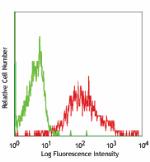
LPS-stimulated (3 days) LOU rat splenocytes stained with 24F... -
FITC anti-rat CD86
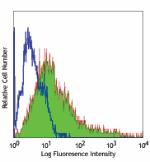
ConA-stimulated (3 days) LOU rat splenocytes stained with 24... -
Biotin anti-rat CD86
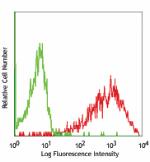
LPS-stimulated (3 days) LOU rat splenocytes stained with bio... -
Alexa Fluor® 647 anti-rat CD86
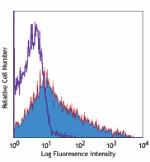
ConA-stimulated (3 days) LOU rat splenocytes stained with 24... -
APC anti-rat CD86
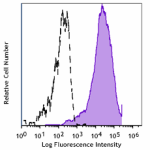
LPS-stimulated (3-day) LOU rat splenocytes were stained with...
 Login / Register
Login / Register 










Follow Us